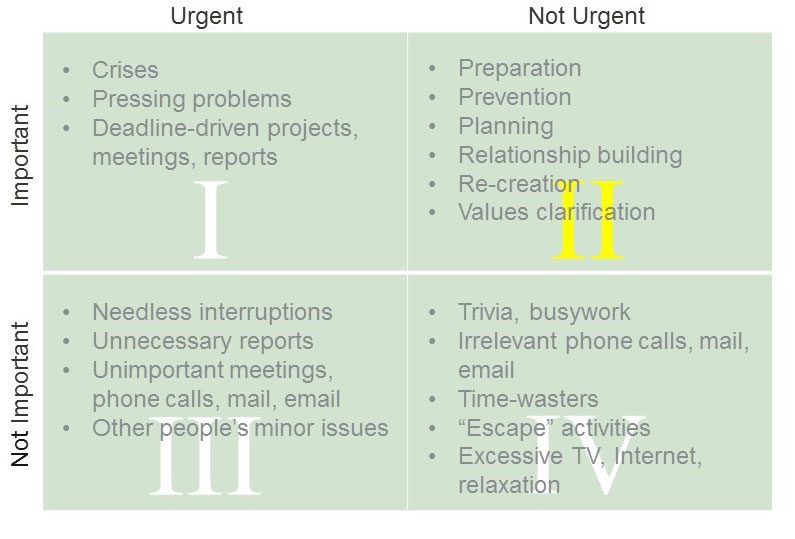Stephen Covey’s book, The 7 Habits of Highly Effective People, is one of the world’s bestselling books on leadership. Guess what the very first habit is?
Be proactive.
Years ago, I worked as an administrative assistant to a team of scientists at the headquarters of Milliken & Company, a chemical and textiles firm located in Spartanburg, South Carolina. It was required that every single employee – no matter what level of employment – attended a week-long intensive Stephen Covey management training. It was the most valuable training I’ve ever received, and I still manage my time according to Covey’s popular 4 quadrant chart, which I’ve recreated below.

You’ll see that the quadrant labeled “II” is highlighted in yellow. That is the quadrant in which all of us should strive to remain. But it’s difficult. In fact, most of us probably spend the majority of our work days in quadrant one attending to crises, the issues of the moment, or trying to meet deadlines. This is how we fall into the dangerous rut of becoming reactive managers instead of proactive managers. That being said, as long as you stay north of the line, in quadrants one and two, you’ll still be more productive than most. And while being productive is important; being proactive actually puts you in control of your own effectiveness.
1. Time Management
As you can see, time management plays a critical role in becoming proactive. In my previous post, I mentioned having to “take time to make time”. When it comes to being proactive, that statement couldn’t be truer. When you realize that the time you sacrifice now, on things like planning and building relationships, sets you up for long term success, you avoid living in a world where your days are filled with never-ending crises.
2. Communication
Another important, but sometimes overlooked factor in becoming proactive, is communication. When deciding to commit to becoming proactive, it might appear from the outside – other departments, your team, your boss – that there is a pause or delay in your productivity. It is important to communicate to everyone that you’re taking a new approach to improve the quality of what you do every day. Explain to them the reasons why. Are certain tasks on important projects falling through the cracks? Are you staying at work late every day trying to play catch-up? Are the services you’re providing suffering? Do people ask you why you haven’t responded to their emails, their invitations, or their requests for assistance? Communicate all of these reasons. Communicate the benefits, too. Yes, there may be some minor inconveniences suffered at first, but it is really critical to the long-term success of not only your career, but to the department and organization as a whole. In fact, you may be surprised to see how many other people start to do the same!
3. Processes
In addition to taking control of your time and communicating your proactive strategy, it is also important to spend time focusing on current processes. From where do your biggest frustrations stem? Make a list, and then drill down to see where the process is broken or could be improved. For example, meetings. Does your day seem to consist of back-to-back, mostly unproductive meetings? Who is scheduling them? Is an agenda provided in advance? Are the right people attending? Could the meeting have been accomplished in an email or a quick phone call instead? Meetings can be huge time-wasters, and are only one example of where you can start being more proactive and saving yourself some valuable time.
4. Change management
No matter what level of changes you decide to make in your effort to become more proactive, be sure to keep your staff’s morale in mind. Dealing with new processes can add a lot of pressure, and at first may seem to do more harm than good. Be sure to keep your staff informed. Recognize their efforts. Provide opportunities for learning and development so they can feel more comfortable with the changes being made. Encourage them not only to ask for help if needed, but to also suggest changes themselves.
It is important to be dedicated to the process of becoming proactive. It is so easy to become distracted on a day to day basis with putting out fires. Yes, it’s true that some crises are unavoidable. But when they are, all of the work you put into being proactive will speak for itself.
Are you still putting out fires, or are you a proactive powerhouse? Share your thoughts!






